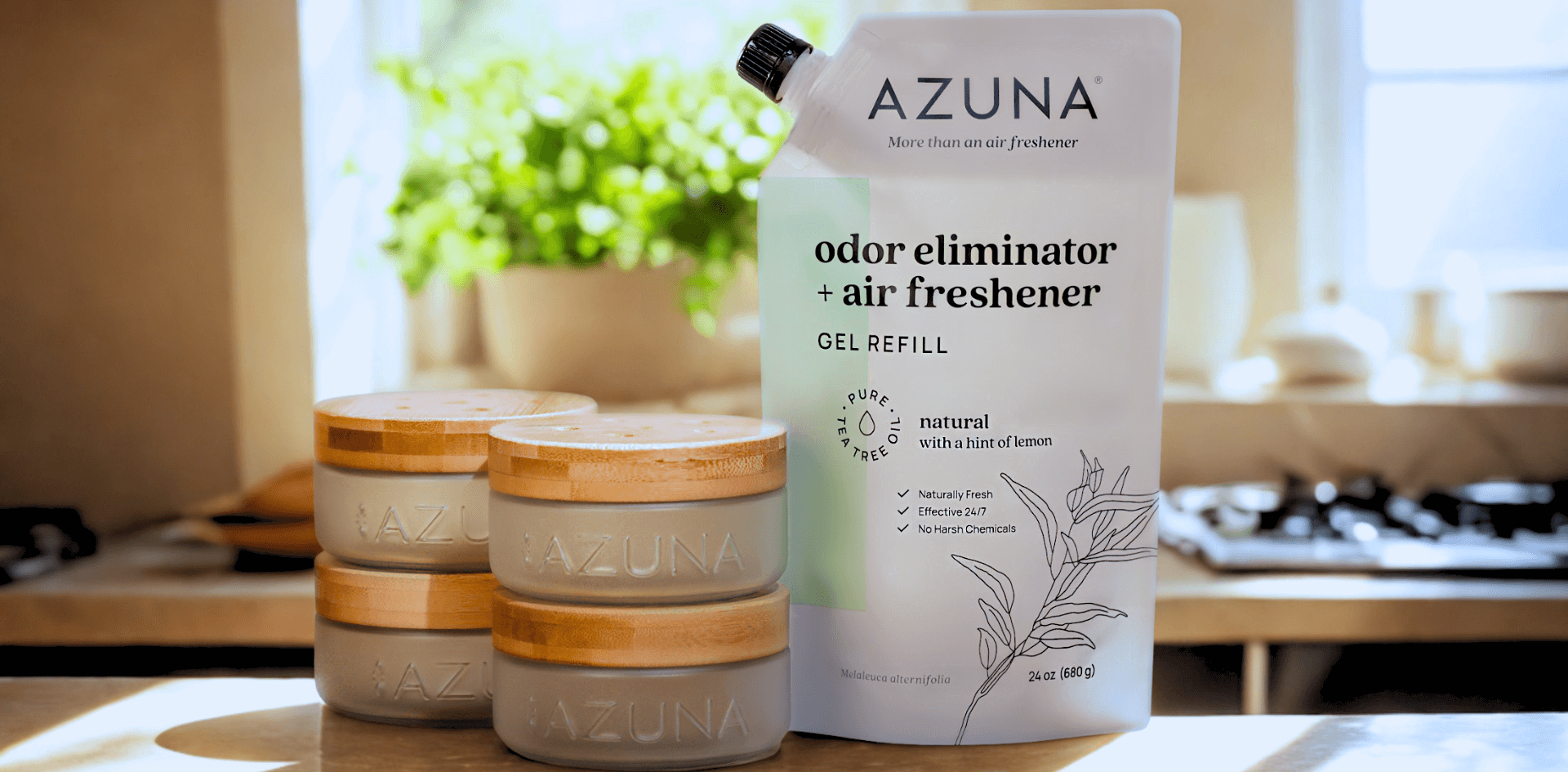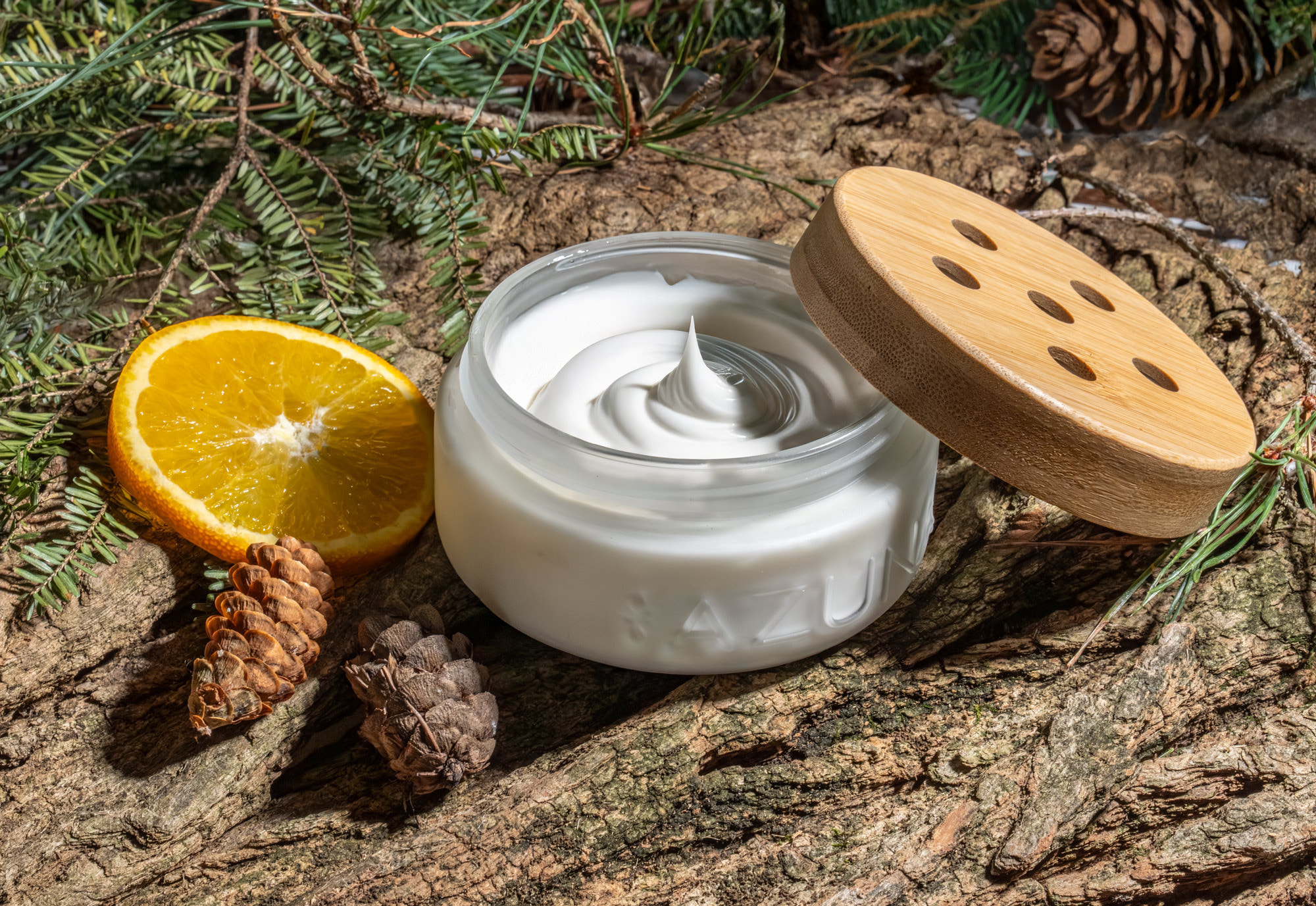A smelly refrigerator is one of those sneaky household issues that’s hard to ignore—but it can be surprisingly simple to solve.
Fridge odors tend to originate from the mix of storage, moisture, and limited airflow found inside. And if you're wondering how to remove odors from fridge spaces without turning to harsh chemical sprays or heavy fragrances, you're not alone.
At Azuna, we believe in safer, plant-powered alternatives that actually work. We've created a guide to help you neutralize tough odors at the source, and prevent them from coming back.
Understanding Why Fridges Develop Odors
Even the most spotless kitchens can fall victim to fridge funk. That’s because refrigerators are closed environments with fluctuating temperatures, high moisture, and a mix of contents.
When things go wrong, your leftovers spoil, spills get missed, airflow gets blocked, and you find smells quickly building. And once those odors settle into drawers, seals, or plastic shelving, they don’t disappear on their own.
Common Sources of Refrigerator Odors
While spoiled food is the usual suspect, it’s not the only one. Common causes include:
-
Forgotten leftovers or produce hidden in drawers
-
Spills from leaking containers
-
Open packaging that releases strong odors
-
Cross-contamination between raw and cooked items
-
Dirty or clogged drip trays
Odors can also stem from things outside your control, like temporary power outages that can cause your fridge interior to warm.
How Moisture and Temperature Fluctuations Contribute to Smells
Humidity creates the perfect conditions for odor development. Every time the fridge door opens, warm air rushes in and moisture levels rise.
Combine that with temperature inconsistencies from overloaded shelves or blocked vents, and you’ve got a recipe for stale smells.
Moisture can also seep into cracks and corners where it’s harder to clean, making odor control more difficult.
Why Regular Maintenance Is Key to a Fresh Fridge
Routine upkeep isn’t just for cleanliness—it’s essential to keeping your fridge fresh. A monthly inspection helps catch small problems before they become smelly surprises.
Even quick habits like wiping spills with Azuna’s Multipurpose Tea Tree Oil Cleaning Wipes when they happen and checking expiration dates can make a big difference in keeping odors at bay.
Steps to Eliminate Refrigerator Odors
When your fridge smells off, it’s time to go beyond surface-level cleaning. Here’s how to do it the right way.
Emptying and Inspecting for Spoiled Food
Start by removing everything. As you do, inspect containers, produce, and jars. Anything with signs of spoilage, leaks, or mold should go.
Take this time to check expiration dates and reorganize items for better visibility moving forward.
Deep Cleaning the Interior and Shelving
Once empty, remove shelves, drawers, and bins. Wash them in warm, soapy water, rinse, and dry thoroughly.
For the fridge interior, use a mild, non-toxic cleaning solution (we recommend one of our cleaning sprays) and wipe down every surface, especially corners, crevices, and under the drawer compartments.
Let it air out with the door open for a few minutes after cleaning to ensure all shelves and drawers are dry.
Cleaning Fridge Seals and Drawers for Hidden Odors
Gasket seals and vegetable drawers often harbor trapped debris and moisture. Use a small brush or toothbrush dipped in mild cleaner to scrub these areas gently.
Be sure they’re completely dry before putting them back—moisture left behind can restart the odor cycle.
Preventing Odors from Returning
Once your fridge is clean and fresh, the next step is keeping it that way.
Prevention is all about consistency—small, thoughtful changes in how you store food, organize shelves, and manage airflow can go a long way.
These strategies not only help avoid unpleasant smells but also extend the life of your groceries and make your fridge easier to use every day.
Proper Food Storage Techniques for Odor Control
The way food is stored plays a major role in preventing odors. Here’s how to minimize smell build-up:
-
Use airtight containers for items like cooked meals, cut fruits, dairy, and anything with a strong scent. This keeps the odor in—and the rest of your fridge unaffected.
-
Wrap meats and cheeses tightly, especially deli items or leftovers that may release aroma over time.
-
Keep produce in designated drawers with adjustable humidity settings, and use produce bags to contain excess moisture.
-
Store opened jars and bottles upright with clean lids. Reseal tightly after every use.
-
Avoid leaving food uncovered, even for a short time—odors spread quickly in cold, enclosed spaces.
-
Label and date leftovers so nothing is forgotten or left too long.
Proper containment can significantly reduce the chances of future fridge odors.
The Importance of Regular Fridge Organization
A tidy fridge isn’t just easier to navigate; it stays fresher, too. When everything has a place, you’re more likely to spot issues before they become problems.
-
Group similar items together, like condiments, beverages, or prepared meals. This reduces cross-contamination and prevents spills from going unnoticed.
-
Practice first-in, first-out. When unloading groceries, move older items to the front and newer ones to the back.
-
Create a “use soon” zone for foods approaching their best-by date so they don’t go to waste.
-
Wipe up spills as they happen to stop smells before they start.
-
Do a weekly check and toss expired items, wipe down shelves, and adjust storage as needed.
A quick five-minute cleanout each week can make a long-term difference in keeping odors away.
How to Keep Fridge Air Circulating for a Fresher Smell
Good airflow inside your fridge is essential for even cooling and odor prevention. Stagnant air can trap moisture and allow smells to build.
-
Avoid overstuffing shelves. Too many items block vents and prevent air from moving freely.
-
Leave a little space between items to allow circulation. This helps maintain consistent temperatures throughout the fridge.
-
Don’t block fan vents, usually located in the back wall—this is the main pathway for airflow inside your fridge.
-
Check for gaps in door seals. A tight seal keeps cold air in and reduces energy use, moisture, and odor buildup.
-
Use a refrigerator-safe odor eliminator, like Azuna’s small-space gel pods, to neutralize tough odors while maintaining natural air flow. They’re a more natural alternative that works continuously without masking scents.
With the right habits in place, your fridge will stay clean and fresh every time you open the door. (And if you're looking to remove dishwasher odors next, we've got that covered, too.)
Choosing the Right Odor Eliminator for Your Fridge
Not all odor solutions are created equal. Many conventional options use harsh fragrances and toxic chemicals to cover up smells without solving the actual issue.
At Azuna, we believe in a more effective option: our natural tea tree oil-based formula works continuously to neutralize tough odors inside closed environments like refrigerators.
Our small odor-eliminating pods are low-maintenance, last between two to three months, and are made with non-toxic and vegan ingredients.
When to Replace Your Fridge Odor Eliminator
For best results, check your Azuna gel between 60 and 90 days. You can refill easily with one of our pouches; just empty out your old gel, dispose, and refresh with new product.
If your fridge sees high traffic or frequent door openings, consider checking more frequently. Regular monitoring ensures continuous odor protection with minimal effort.
Ready to make your fridge smell like it should? Explore our refrigerator-safe odor eliminators and discover a more natural alternative to harsh chemical sprays.







